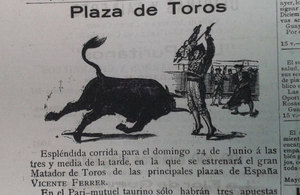A Football Series: Blog 3 - Football, politics and Ecuador
Professor Mathew Brown is visiting Ecuador to discover the history of football and its South American roots. This is the third blog about his discoveries in old ecuadorean archives and some very revealing information.

Blog 3
In my book From Frontiers to Football; An Alternative History of Latin America since 1800, I describe how the continent has been part of global networks since before its Independence from Iberian empires in the nineteenth century. Sometimes Latin Americans have embraced goods, ideas and people who have come from far away, and at other times they have resisted them. Often, some embraced and others resisted at the same time, which created economic, political and social conflicts, and fed into civil warfare.
Football reached Latin American ports from abroad, often through the actions of Britons like Charles Miller in Sao Paulo, or the Wright brothers in Guayaquil. At the end of the nineteenth century many people adopted this simple sport, and they played it in the streets, in school playgrounds, in fields and in pitches which had been set out for other sports. Others did’t want anything to do with this new sport that they thought was barbaric, brutal, violent and passionate. Perhaps some of us in 2014, whose national teams have left the World Cup in ignomious ways – I am thinking of England, Ecuador and Brazil in particular – might share these reflections of our sceptical ancestors.
During the last month I have been carrying out research in several Quito archives looking for clues as to how football was first received in Ecuador at the beginning of the twentieth century. I have read the Statutes of the first sports clubs in the democratic and austere environs of the National Library, and looked at pamphlets in the comfortable armchairs of the library of the Culture Ministry. I have put on surgical gloves and a face mask to protect myself from whatever might be lurking in these century-old papers. I have also been privileged to consult the collections of the El Comercio newspaper in its offices, and the immense collection of the Aurelio Espinosa Polit library in Cotocollao. I had been there before, in 2001, when I was investigating the history of Independence, and the role of British mercenaries in Simon Bolivar’s armies. I remembered the bus journey from the centre of Quito, which felt like one was leaving the city and going out to the countryside. In the 13 years between my two visits, Quito has become a metrópolis, and there is no doubt that Cotocollao is now fully part of it.
I am half way through my Ecuadorian research. I have discovered that Ecuador, at the start of the twentieth century, was between two worlds. In the newspapers of the time, sporting reports tend to refer to bull-fighting and horse-racing. In Guayaquil, regattas were also significant. Certainly, football did not replace these traditional sports overnight. The most ineresting examples I have found are where there is fusión, cross-over and hybridity between the new and old sports. In Guayaquil in 1899 a businessman held an event that combined bull-fighting with cycling. The cyclists raced around the bull-ring – inside it, on the sawdust – for 25 laps, as a prelude to the entrance of the bulls. In 1906, in the El Ejido park in Quito, President General Eloy Alfaro watched a polo match, ‘the sport of kings’ put on by the organiser of one of Quito’s first tennis clubs. Polo had been brought to South America by the British from India, and in Quito it was adopted as the favourite entertainment of the North American bankers and railway builders who were closely linked to President Alfaro.
The world was globalizing quickly at the beginning of the twentieth century, and changes occured rapidly. In Ecuador the Liberal Revolution (1895-1912) depended upon the opening up of international markets for its cacao exports, bu it also employed a nationalist and ant-foreigner discourse which sometimes won it popular support. For the politicians and businessmen of the time, their sporting choices were political choices. Going to the Bull-Ring, riding a bike or playing fooball demonstrated their preferences and sympathies to the wider public.
In From Frontiers to Football I use the example of football to show how a social and cultural practice can be adopted, some would say transculturated, and converted into the central element of the construction of nations by the middle of the twentieth century. In Ecuador the process began a Little later than in Brazil or Argentina, perhaps. This was not because Ecuador was a backward country, but because other sports and forms of entertainment maintained considerable support amongst the population.